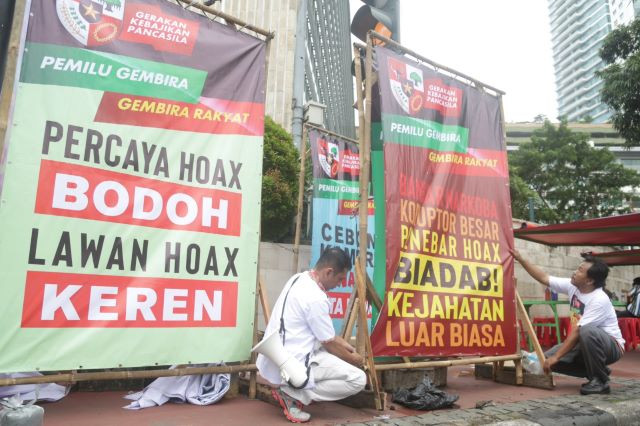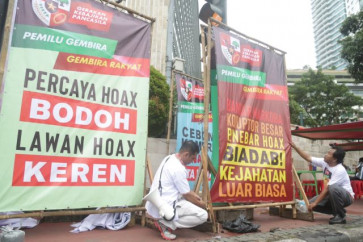Popular Reads
Top Results
Can't find what you're looking for?
View all search resultsPopular Reads
Top Results
Can't find what you're looking for?
View all search resultsAddressing the damage done by post-truth politics to democracy, media
Reinforcing information criticality, and nurturing inclusive dialogue is essential to counteracting the pervasive impact of post-truth politics and ensuring the resilience of democratic processes.
Change text size
Gift Premium Articles
to Anyone

As the impact of the post-truth political trend becomes increasingly evident in the 2024 election, concerns about the integrity of democratic processes and the credibility of journalism have grown. The proliferation of fake news, misinformation and the manipulation of information in political communication threatens the public's trust in the media and undermines the foundations of democracy and citizen engagement. This phenomenon raises pressing questions about trust in information dissemination in the digital age and necessitates urgent efforts to address the challenges posed by post-truth politics and the spread of fake news.
Post-truth politics, which some commentators prefer to call post-factual politics or post-reality politics, refer to a recent historical period where political culture is marked by public anxiety about what claims can be publicly accepted facts.
The emerging trends of post-truth politics and the widespread dissemination of fake news are posing serious threats to political communication, election campaigns and media coverage. The negative impacts of misinformation on democracy, public discourse and trust in the media are increasingly apparent. Therefore, it is crucial to consider potential opportunities for reform, regulation and revitalization of the public sphere to combat this.
Recent research has indicated that post-truth politics and the proliferation of fake news have significantly eroded public trust in the media. The abundance of information, coupled with the coexistence of false narratives alongside factual content, has led to confusion and uncertainty among the public. This highlights the need for enhanced critical thinking skills and collaborative efforts to counter the spread of fake news.
In Indonesia, research by the Katadata Insight Center has shown that a significant percentage of the population is exposed to hoaxes while accessing information online, with a relatively small number of them able to discern and verify the accuracy of the information they receive. The dominance of post-truth narratives, characterized by emotional appeals and personal biases, has overshadowed the presentation of factual information, thus undermining the public's ability to distinguish truth from manipulation.
Post-truth politics not only challenges the integrity of the media as purveyors of truth and objectivity but also intensifies political polarization within society. As political identity takes precedence over facts, there is a risk of further deepening societal divisions. However, amid these challenges, there are opportunities to strengthen inclusion and evidence-based dialogue, addressing the underlying issues of polarization and trust in information dissemination.

The social impact of fake news extends beyond political discord and threatens social harmony and political stability. Consequently, there is a critical need to enhance media literacy and critical thinking skills in society, enabling individuals to discern valid information from false narratives.


















